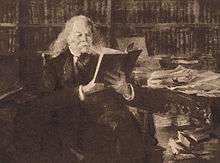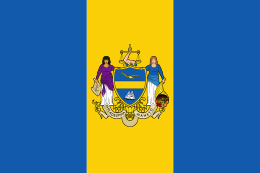Richard Vaux
Richard Vaux (December 19, 1816 – March 22, 1895) was an American politician. He was mayor of Philadelphia and a member of the U.S. House of Representatives from Pennsylvania.
Life

Richard Vaux was born in Philadelphia, Pennsylvania, December 19, 1816, the son of the lawyer philanthropist Roberts Vaux. He was educated by private tutors at the Friends Select School in Philadelphia and Bolmar's French School in West Chester, Pennsylvania. After studying law, Richard Vaux was admitted to the Pennsylvania bar in Philadelphia on April 15, 1837, about a year after his father's early death. Vaux traveled to London with government dispatches and remained for a year to serve as secretary of legation under Andrew Stevenson, United States Minister to Great Britain.
Vaux returned to Philadelphia in 1839 and was elected a member of the Pennsylvania State House of Representatives, then a delegate to the Democratic State convention in 1840. Vaux began the private practice of law in Philadelphia in 1840, around the time of his marriage as mentioned below. Vaux served as recorder of deeds of Philadelphia from 1842 to 1849, although the position lacked any salary, and in 1845 published the Recorders' Decisions which became well known (as was his never having been reversed by a higher court). The Supreme Court of Pennsylvania appointed Vaux Inspector of the State Penitentiary for the Eastern District of Pennsylvania in 1842, and he served as secretary and later as president of the board of inspectors until his death.
An unsuccessful candidate for mayor of Philadelphia in 1842, 1845, and 1854 as a Democrat opposing Whig candidates, Vaux was elected in 1856, but was defeated for reelection in 1858 by Alexander Henry. Vaux also served as a member of the Board of City Trusts 1859-1866, and its president 1863-1865.
Deeply involved with the Masonic fraternity since the age of 26, Vaux served as Grand Master of the Grand Lodge of Pennsylvania in 1868. He thus laid the cornerstone of the iconic grand temple in Philadelphia which remains the headquarters for Freemasonry in the state, symbolically tapping it into place with the same gavel George Washington had used during the Masonic cornerstone ceremony for the United States Capitol building.
Vaux was elected in 1890 as a Democrat to the 51st Congress to fill the vacancy left by the death of Samuel J. Randall and served from May 20, 1890 to March 3, 1891, having lost his bid for reelection in 1890.
Vaux married on March 12, 1840, Mary Morris, daughter of Jacob Shoemaker and Sarah Morris Waln. Richard and Mary Vaux had six children, of whom Jacob Waln Vaux was the fifth.
Vaux died on March 22, 1895 in Philadelphia, where he is buried in Laurel Hill Cemetery.
External links
- United States Congress. "Richard Vaux (id: V000078)". Biographical Directory of the United States Congress.
| Political offices | ||
|---|---|---|
| Preceded by Robert Thomas Conrad |
Mayor of Philadelphia 1856–1858 |
Succeeded by Alexander Henry |
| United States House of Representatives | ||
| Preceded by Samuel J. Randall |
Member of the U.S. House of Representatives from Pennsylvania's 3rd congressional district 1890–1891 |
Succeeded by William McAleer |
